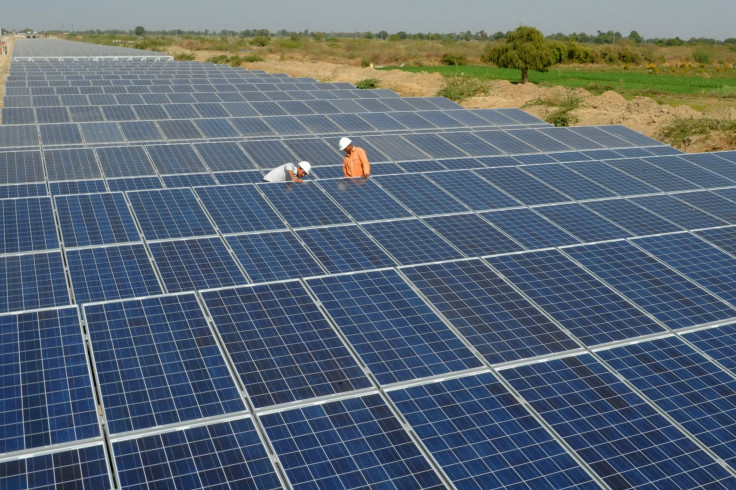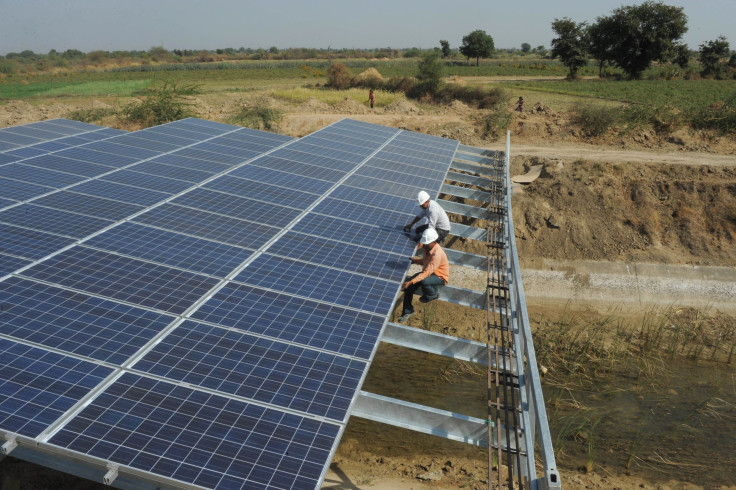SunEdison Inc. (SUNE) Facing Financial Troubles As $1.4 Billion Potential Default Looms For Clean Energy Developer

Financial troubles are adding up for SunEdison Inc., the world’s biggest clean energy developer. The Missouri company could face a $1.4 billion technical default this week if it fails to file a long-delayed annual report.
Amid an aggressive growth strategy, SunEdison has seen its share price plunge more than 90 percent in the last year on growing concerns about the firm’s ability to generate cash and pay down debt. The company has twice postponed the release of its 10-K filing for its 2015 financial performance.
If SunEdison fails to file the document by a March 30 deadline, missing a third deadline, it must reach an arrangement with lenders on at least $1.4 billion in loans and credit facilities or face a potential default, Bloomberg reported.
SunEdison more than doubled its debt last year to $11.7 billion as it acquired renewable energy companies and projects across the globe. The company and its subsidiary, TerraForm Power Inc., acquired First Wind Holdings Inc. for $2.4 billion in May, positioning SunEdison as one of the world’s largest wind and solar power developers. But several of its acquisition deals recently unraveled, sparking legal battles. And SunEdison has struggled to sell off its existing power projects and soothe shareholders.
“Many investors think they were looking to do too much too quick,” said Angelo Zino, an equity analyst with S&P Global Market Intelligence in New York. “If they’re not selling these projects, they’re not generating cash flow, and if they’re not generating cash flow they can’t meet debt obligations. It’s gotten investors even more worried.”
SunEdison’s struggles arrive as the U.S. solar industry is gearing up for another blowout year in new project installations. Thanks to the renewal of lucrative federal tax credits and rising demand from U.S. homeowners and utilities, the solar industry is projected to add roughly 16,000 megawatts of solar power capacity this year, a 120 percent hike from last year’s record growth of 7,300 megawatts, GTM Research said in a recent report.
Other solar developers have sought to distance themselves from SunEdison, whose financial problems cast a dark cloud over the industry’s otherwise sunny outlook.
“The travails of one company will not stop the rise of solar power,” said Rod MacGregor, co-founder and CEO of GlassPoint Solar, based in Fremont, California. “We stand at a watershed moment where solar technologies are both proven and economical.”
Along with developing clean power projects, SunEdison’s business strategy is tied to its two investment platforms, called “yieldcos.” The subsidiaries own and operate renewable energy facilities that have secured long-term contracts to sell renewable electricity to utilities or other buyers.
The idea was to create entities that would appeal to investors by separating the lower-risk, higher-quality power assets from more volatile operations like solar panel production, or new project development. SunEdison sold its projects to its yieldcos, using the proceeds to continue acquiring companies and developing new projects, some of which would feed back into the yieldco.
SunEdison’s first yieldco, TerraForm Power, operates over 200 solar power projects in the Americas. The offshoot raised about $500 million from its initial public offering in July 2014, at about $25 a share, as well as $65 million from two additional private stock sales. The second yieldco, TerraForm Global Inc., launched in July to focus on renewable energy projects in southeast Asia and Africa. That subsidiary raised $675 million at $15 a share — less than SunEdison’s initial target of about $20 a share.

Shares of both yieldcos have plunged in recent months amid growing uncertainties across the industry about the investment vehicles. TerraForm Power (NASDAQ:TERP) was trading around $8.49 a share Monday afternoon, down 80 percent from its April 2015 peak of about $42. TerraForm Global (NASDAQ:GLBL) was down 83 percent from its opening price, trading at $2.52 a share late Monday.
SunEdison (NYSE:SUNE) gained 8.7 percent to $1.31 a share, down from its peak of $32 a share in June.
Zino, the S&P analyst, said it wasn’t entirely clear why yieldcos in general have performed poorly in recent months. He said it might be related to the broader investor anxiety about whether the U.S. Federal Reserve would raise short-term interest rates. (The Fed in December ultimately raised rates a quarter percentage point, to between 0.25 and 0.5 percent — a far cry from the rate that could be expected after a normal economic recovery.)
“We saw a number of higher yielding investments actually sell off last year in anticipation of the Feds starting to increase rates,” Zino said. When rates increase, the cost of capital similarly rises, making clean energy investments more expensive and yieldcos less attractive for investors.
A surge of interest in the clean energy subsidiaries also sparked concerns of a yieldco supply glut, potentially dampening shares in the entities, he added.
Beyond the yieldcos, SunEdison’s core business has struggled to land major acquisitions once hailed as key to the company’s high growth strategy. The company in July announced a deal to buy residential solar company Vivint Solar Inc. for about $2.2 billion in cash, stock and notes. Ahmad Chatila, SunEdison’s CEO and chairman of TerraForm Power, said the buyout was “a logical next step” in SunEdison’s transformation into a global clean energy powerhouse.
The deal was delayed and renegotiated down to $1.9 billion. Then Vivint canceled the merger agreement this month after SunEdison missed deadlines to close the transactions. Now the California rooftop installer is planning to seek “legal remedies” against SunEdison.
Patrick Jobin, an analyst at Credit Suisse Group AG, said the failed merger had a silver lining for SunEdison, as it improved the companies’ near-term access to its liquid assets. But “it also highlights how precarious the liquidity position likely is,” he said in a March 8 research note provided via email.
Another SunEdison deal crumbled in October. Latin America Power BV reportedly walked away from its sale to SunEdison after the larger company failed to make a roughly $400 million upfront cash payment, more than half the value of the $700 million merger. SunEdison and its yieldco TerraForm Power reached a $28.5 million settlement agreement with Latin America Power to resolve legal disputes related to the bungled deal.
Following SunEdison’s tough year, the company in late February delayed filing its annual 2015 report while it conducted an internal investigation into its financial position. Former executives have alleged that SunEdison misrepresented its liquidity position, although no wrongdoing has been found at this point. SunEdison in March postponed filing its report for a second time, saying it found “material weaknesses” in its financial reporter, primarily related to problems with a newly adopted IT system.
Jobin, the Credit Suisse analyst, said the lack of reporting made it difficult for banks to know the company’s financial position or whether SunEdison could meet its obligations to lenders and creditors. SunEdison said in a Jan. 7 presentation that it expected to have $619 million of cash on hand by the end of 2015, the bulk of which was committed to project development.
The company in recent months took on two separate credit facilities, totaling $1.4 billion, which require SunEdison to provide financial disclosures. In its agreement for a $725 million second-lien credit facility, SunEdison is required to release an audited financial statement within 90 days of the end of its fiscal year — or March 30, according to documents filed with the U.S. Securities and Exchange Commission.
“If they have not filed by March 30, they will be in default,” Ian Feng, an analyst at Covenant Review LLC, a credit research firm, told Bloomberg. SunEdison then has 15 days to address the breach. If the company still hasn’t filed a report by April 14, then it will enter an “event of default,” Feng told the news outlet.
S&P’s Zino said SunEdison’s lender could still grant the troubled solar company an extension in exchange for some kind of penalty, such as a higher interest rate. A technical default “doesn’t mean all is lost for the company,” he said. “There’s a lot of moving parts here.”
© Copyright IBTimes 2024. All rights reserved.











